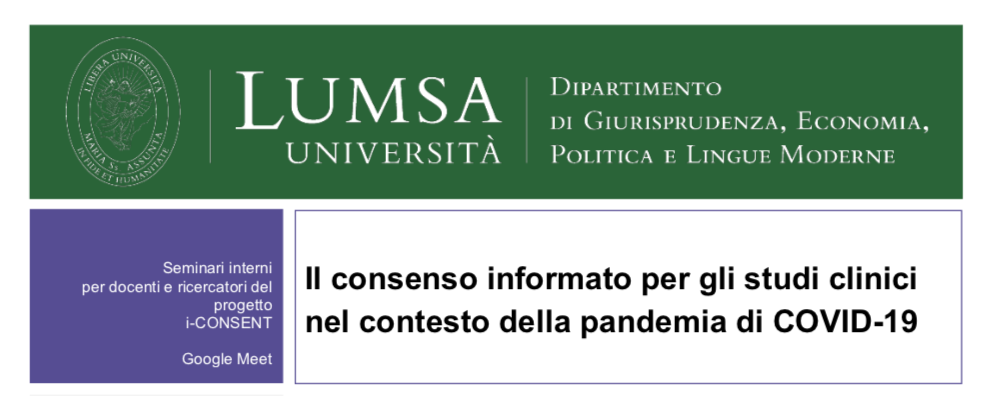Summary of the i-CONSENT’s conversations on informed consent in the context of the COVID-19 third session
During his talk on December 9, 2020, Prof. G. Comandé, put forward several important arguments regarding COVID-19 implications for informed consent.
- Protecting personal data does not slow down research;
- In research (differently from hospital contexts) the protection of personal data does not require a “specific” format -a sort of exceptional right connected to the emergency- linked to the COVID-19 pandemic;
- The eruption of the COVID-19 pandemic has “helped” research in speeding up the cultural process of collaboration between institutions, centres, etc.
Clinical experimentation in emergency situations also concerns the issue of privacy. At a European level, the relationship between clinical trials regulation and personal data protection regulation has become closer than before recently -and COVID-19 had an impact on that. For example, the GDPR has “freed” research in a sense (with broader and more all-encompassing consents called “blanket consent”) and this seems to be more and more the road for clinical trials. We can give broad and selective consents (giving consent for e.g. public research, etc.), but in a less totalizing way that would slow down or interrupt research.
With the advancement of technology, the collection of data can now be done by remote as well as onsite and, obviously, the former option has increased drastically due to COVID-19. For example, in the US the FDA requested to move from onsite to remote. To make such a change is important in times of pandemic, but we also need to understand what this shift can imply for the scientific validity of the trials.
Hacking being the main threat
If we have a trial with multiple sites, we need to make sure that each site can follow through with the new directives, because otherwise we risk losing the value of the collected data if some of those are not capable to comply with the requirements (i.e. if some of the sites have outdated, unstable internet connections or easily hackable computers they would put at risk our privacy.
Finally, Data philanthropy (where private -individuals or companies share data for the pubic good) opens the door to clinical trials and beyond as the whole paradigm of owning one’s data will change further as the result of the pandemic. Data sharing might be also coming under stress within the EU as different countries could have different levels of security.
Prof. G. Comandé is Full Professor of Private Comparative Law at Scuola Superiore S. Anna Pisa, Italy, an external scientific and ethical expert evaluator for the European Commission and he is part of the task-force “Data-driven working group for the Covid-19 emergency” appointed with a specific decree by the Minister for Technological Innovation and Digitization, Paola Pisano, which brings together 74 experts in different operators with the aim of selecting and evaluating the proposals received by the Ministry for the containment of the Covid-19 pandemic through the analysis and use of data and data-analytics apps for tracing the infection.
